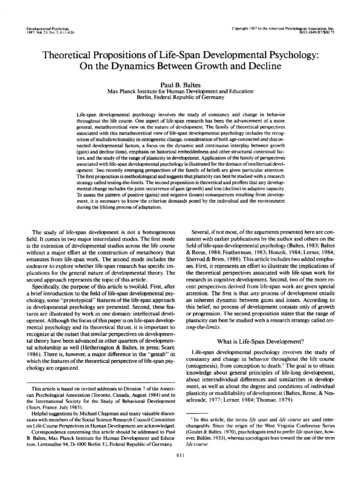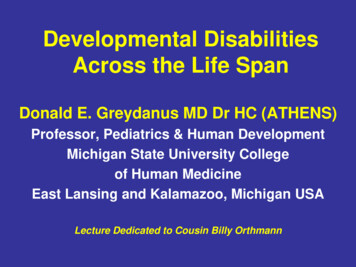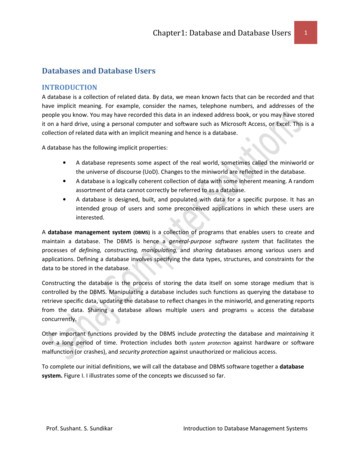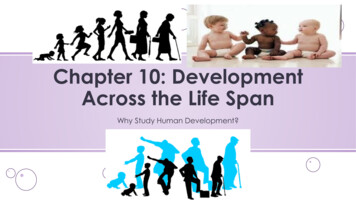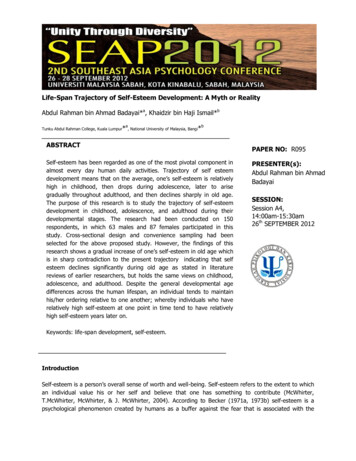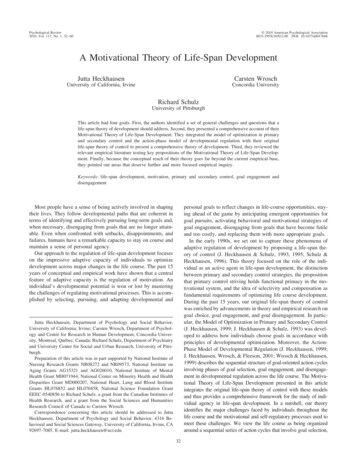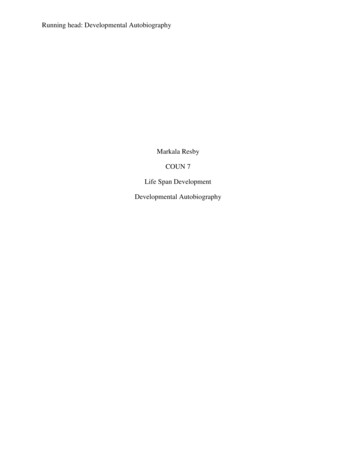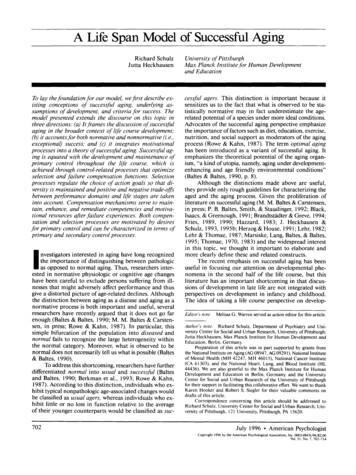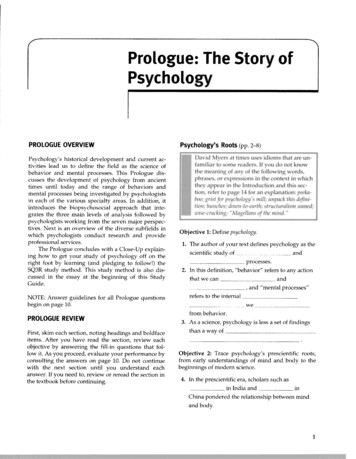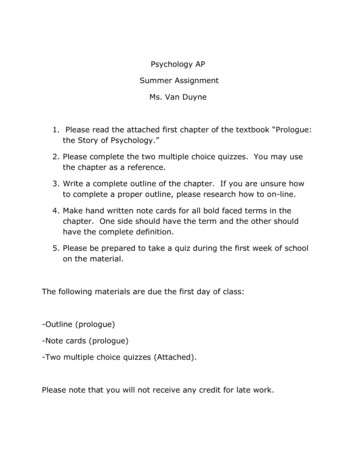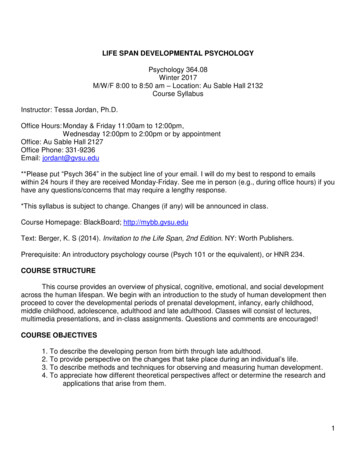
Transcription
LIFE SPAN DEVELOPMENTAL PSYCHOLOGYPsychology 364.08Winter 2017M/W/F 8:00 to 8:50 am – Location: Au Sable Hall 2132Course SyllabusInstructor: Tessa Jordan, Ph.D.Office Hours: Monday & Friday 11:00am to 12:00pm,Wednesday 12:00pm to 2:00pm or by appointmentOffice: Au Sable Hall 2127Office Phone: 331-9236Email: jordant@gvsu.edu**Please put “Psych 364” in the subject line of your email. I will do my best to respond to emailswithin 24 hours if they are received Monday-Friday. See me in person (e.g., during office hours) if youhave any questions/concerns that may require a lengthy response.*This syllabus is subject to change. Changes (if any) will be announced in class.Course Homepage: BlackBoard; http://mybb.gvsu.eduText: Berger, K. S (2014). Invitation to the Life Span, 2nd Edition. NY: Worth Publishers.Prerequisite: An introductory psychology course (Psych 101 or the equivalent), or HNR 234.COURSE STRUCTUREThis course provides an overview of physical, cognitive, emotional, and social developmentacross the human lifespan. We begin with an introduction to the study of human development thenproceed to cover the developmental periods of prenatal development, infancy, early childhood,middle childhood, adolescence, adulthood and late adulthood. Classes will consist of lectures,multimedia presentations, and in-class assignments. Questions and comments are encouraged!COURSE OBJECTIVES1. To describe the developing person from birth through late adulthood.2. To provide perspective on the changes that take place during an individual’s life.3. To describe methods and techniques for observing and measuring human development.4. To appreciate how different theoretical perspectives affect or determine the research andapplications that arise from them.1
COURSE REQUIERMENTSExams (100 points each, 300 points total): Three exams will be given covering materialpresented in the lectures and text. Be advised that you are responsible for material that will bepresented ONLY in class and ONLY in the text. Lecture material will make up approximately 85% ofeach exam and textbook material make up approximately 15% of each exam. All of the exams arenoncumulative. Exams will consist of objective questions in multiple choice format.Make up exams: Occasionally there are legitimate reasons for missing an exam. I will,however, allow you to take a make-up exam ONLY if you inform me 48 hours in advance that you willhave to miss the exam. If you become extremely sick or encounter some other emergency on the dayof the exam, I must be notified by email within 12 hours of the scheduled exam time and you willneed to show some verification (e.g., a note from your physician, an accident report, etc.). Missedexams or failure to comply with these policies will result in a zero on the exam.Pop Quizzes (4 points each, 40 points total): Throughout the semester there will be 12 popquizzes given and the lowest two scores will be dropped. Pop Quizzes will consist of 4 multiplechoice questions (worth 1 point per question) that will assess your knowledge only on topics coveredin the most recent lecture. You will not be tested on anything outside of lecture material for quizzes.Pop quizzes will occur at the beginning of class (usually, within the first five minutes of class). If youare late for class that day, there are no make-ups. If you show up halfway through a quiz, you will notbe allowed to turn in a partial quiz.Pop quizzes give you a chance to keep up with the material. They are not meant to punish youor your grade. Instead, I hope they will aid you in seeing how well you understand the material. If youfind yourself struggling with the quizzes, you should see me for additional help.In-class Assignments (10 points each, 50 points total): You will have the opportunity tocomplete 5 in-class assignments throughout the semester, each worth 10 points. To receive credit,you must be in class and turn in your assignment at the end of class. To maintain fairness to all,make-up opportunities for in-class activities cannot be granted.Homework (10 points each, 50 points total): You will have the opportunity to complete 5homework assignments throughout the semester, each worth 10 points. These assignments willrequire you to apply principles that we have covered in class. You will be given the details of theassignment and will write a brief paper (minimum 1 page – maximum 3 pages) for each homeworkassignment. Homework assignments will be submitted though BlackBoard, by midnight of the datedue. More information about these assignments will be provided later in the semester.Late Homework: If a homework deadline is missed due to illness or some other emergency, Imust be notified by email within 12 hours of the scheduled due date and you will need to show someverification (e.g., a note from your physician, an accident report, etc.). Assignments that are notturned in, or are turned in late and fail to meet these regulations will result in a zero.Grading: Grades are based on points earned in the class. The total number of points possiblefor the class is 440. Grades will not be curved. Your final grade will consist of your three examscores, your scores from your best ten Pop Quizzes (out of 12), five In-Class Assignments, and yourscores on the five Homework Assignments.2
AssignmentTotal Possible Points100100100405050440Exam 1Exam 2Exam 3Pop Quizzes (10)In-Class Assignments (5)Homework (5)TotalPercent of Grade 23% 23% 23% 10% 11% 11%Grading Scale:Your Total Points414-440394-413381-393364-380350-363Letter GradeAAB BB-Your Total Points336-349319-335305-318294-304262-293261 and belowLetter GradeC CCD DF**If your grade is at the .5 mark, I will round up (i.e., 363.5 will be rounded up to 364). I will not adjustyour grade in any other way. Please do not ask at the end of the semester.COURSE POLICIESAccommodation of Learning Disabilities/Special Needs: Disability: If you have a learning,physical or other disability that would impact your ability to master the material in this course and/ortake the exams as described above, please contact GVSU’s Disability Support Services (DSS) at616-331-2490 or http://www.gvsu.edu/dsr/ to arrange for special accommodations. Furthermore, ifyou have a physical disability and think you will need assistance evacuating this classroom and/orbuilding in an emergency situation, please make me aware so we can develop a plan to assist you.Withdrawal: In accordance with University regulations, students withdrawing by the ninth week(March, 11th 5:00pm) will be assigned a grade of W (withdrawal). Students withdrawing after thedeadline to withdraw will be assigned a letter grade based on their performance in the class. Note: It isyour responsibility to drop yourself from this class.Incomplete: Under special circumstances, a grade of Incomplete (I) can be granted. See meas soon as possible to arrange this, and provide me with written documentation of why the coursecould not be completed. Note that an Incomplete grade must be completed by the end of the nextacademic semester, or is automatically converted to an F. An Incomplete will not be given for fallingbehind in the course or wanting to repeat the course for a better grade.3
Integrity of Scholarship and Grades: All academic work will be done by the student to whom itwas assigned. Anyone caught cheating (e.g., procuring, providing or accepting any materials whichcontain questions or answers to any exam or assignment, submitting work that has been previouslygraded) or plagiarizing (taking ideas or material from another source for either written or oralpresentation without acknowledging the original source) will be dropped from the course, given an F,and referred to the University for further action. Cheating is a serious violation of academic integrity.For more information on academic honesty please see the GVSU student code.In-Class Behavior: It is very important to minimize disruptions and to show respect andconsideration for other students as well as the academic process. For this reason, please get to classon time, and once the lecture starts, please refrain from talking, texting, reading, or sleeping. Whenyou come to class, please be prepared to actively listen and take notes. If you need to leave classearly, please sit near an exit and leave quietly.Meijer Writing Center: To assist you with any writing project, at any stage of your writingprocess. The center's well-trained peer consultants can help you to brainstorm ideas, organizecontent, integrate research, polish a draft, and correctly document sources. Make an appointment orvisit during drop-in hours. Visit http://www.gvsu.edu/wc/ or Call 331-2922.SASC Tutoring Center: Need help understanding your course content or writing a paper?Want to learn more efficient study strategies? SASC Tutoring Center can assist with most coursesand academic writing assignments. Visit http://www.gvsu.edu/tc/ for the most current information onservices, hours, and locations.Fire:In the event of a fire, immediately proceed to the nearest exit during a fire alarm. Do not useelevators.COURSE SCHEDULEThe following is a tentative schedule for the information that we will cover and exam dates. THISSCHEDULE IS SUBJECT TO CHANGE! Keep in mind that you are responsible for all materialcovered in the assigned chapters for tests regardless of whether or not it is covered in class.Week/Dates1. January 9, 11, 13TopicReview SyllabusChapter 1: The Study of Human Development2. January 1618, 20Martin Luther King Jr. Day – NO CLASSChapter 1: Research MethodsIn-Class Assignment #1. Jan 20th3. January 23, 25, 27Chapter 2: Prenatal DevelopmentChapter 2: Heredity and EnvironmentHomework Assignment #1 Due on 25th4
4. January 30,February 1, 3Chapter 3: Action and perception development in infancyChapter 3: Cognitive development in infancyHomework Assignment #2 Due on 3rd5. February 6 , 8, 10Chapter 4: Socioemotional development in infancy6. February 13, 15, 17Homework Assignment #3 Due on 13thChapter 4: Socioemotional development in infancy continuedEXAM 1: CHAPTERS 1- 4. Feb 15th7. February 20, 22, 24Chapter 5: Cognitive development in early childhoodChapter 6: Socioemotional dev in early childhoodHomework Assignment #4 Due on 24thIn-Class Assignment #2. Feb 24th8. February 27March 1, 3Chapter 7: Cognitive development in middle childhoodChapter 8: Socioemotional dev. in middle childhoodIn-Class Assignment #3. March 3rd9. March 6-10SPRING BREAK – NO CLASSES10. March 13, 15, 17Chapter 8: Socioemotional dev. in middle childhood continuedIn-Class Assignment #4. March 15thChapter 9: Physical development in adolescence11. March 20, 22, 24Chapter 10: Socioemotional development in adolescenceEXAM 2: CHAPTERS 5-10. March 24th12. March 27, 29, 31Chapter 11: Biosocial development in emerging adulthoodChapter 11: Socioemotional dev in emerging adulthoodChapter 12: Biosocial development in adulthood13. April 3, 5, 7Homework Assignment #5 Due on the 3thChapter 13: Socioemotional development in adulthoodChapter 14: Biosocial development in late adulthoodApril 7th – NO CLASS14. April 10, 12, 14Chapter 14: Biosocial development in late adulthood continuedFilm: The Passage of TimeIn-Class Assignment #5. April 12th15. April 17, 19, 21Chapter 15: Socioemotional dev. in late adulthoodReview Session and Student Evaluations16. Monday, April 24th 8:00 to 9:50amEXAM 4: CHAPTERS 7-15.5
HOW TO SUCCEED IN PSYCH 364: Read textbook Chapter associated with each lecture before the lecture is given. This willprovide you with a broader context for understanding the material presented in class.Attend each class!During lectures, fill-out your Lecture Outline, take additional notes and make note of examplesgiven in class. The Lecture Outlines are intended as a guide only. Filled-in Lecture Outlinesalone will not provide you with all the necessary material to succeed in this course. Additionallecture notes will be essential when you study for the exams.Prepare for exams well in advance. You should re-read your lecture notes each day after classand review material on a weekly basis. If you wait until the last minute to begin preparing foran exam, you are unlikely to perform as well.Come to office hours (or make an appointment to meet with me) if you need to discussanything pertaining to this course.6
This course provides an overview of physical, cognitive, emotional, and social development across the human lifespan. We begin with an introduction to the study of human development then proceed to cover the developmental periods of prenatal development, infancy, early childhood, mid
